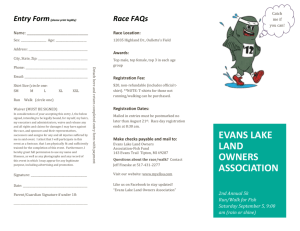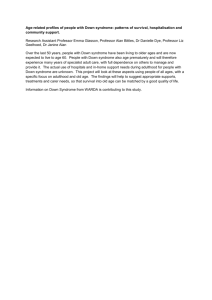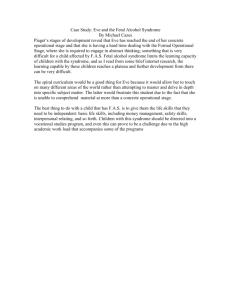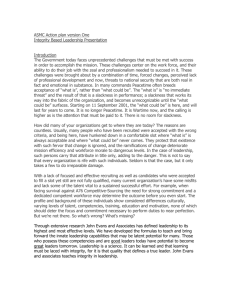Patient information sheet (PAEDIATRIC)
advertisement
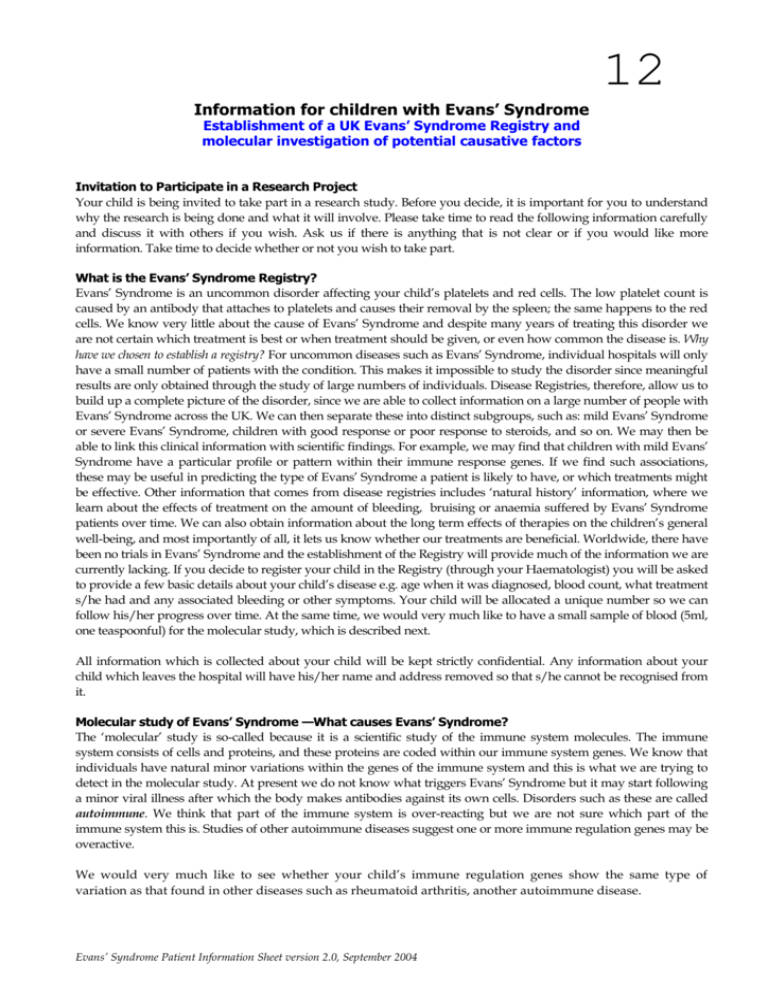
12 Information for children with Evans’ Syndrome Establishment of a UK Evans’ Syndrome Registry and molecular investigation of potential causative factors Invitation to Participate in a Research Project Your child is being invited to take part in a research study. Before you decide, it is important for you to understand why the research is being done and what it will involve. Please take time to read the following information carefully and discuss it with others if you wish. Ask us if there is anything that is not clear or if you would like more information. Take time to decide whether or not you wish to take part. What is the Evans’ Syndrome Registry? Evans’ Syndrome is an uncommon disorder affecting your child’s platelets and red cells. The low platelet count is caused by an antibody that attaches to platelets and causes their removal by the spleen; the same happens to the red cells. We know very little about the cause of Evans’ Syndrome and despite many years of treating this disorder we are not certain which treatment is best or when treatment should be given, or even how common the disease is. Why have we chosen to establish a registry? For uncommon diseases such as Evans’ Syndrome, individual hospitals will only have a small number of patients with the condition. This makes it impossible to study the disorder since meaningful results are only obtained through the study of large numbers of individuals. Disease Registries, therefore, allow us to build up a complete picture of the disorder, since we are able to collect information on a large number of people with Evans’ Syndrome across the UK. We can then separate these into distinct subgroups, such as: mild Evans’ Syndrome or severe Evans’ Syndrome, children with good response or poor response to steroids, and so on. We may then be able to link this clinical information with scientific findings. For example, we may find that children with mild Evans’ Syndrome have a particular profile or pattern within their immune response genes. If we find such associations, these may be useful in predicting the type of Evans’ Syndrome a patient is likely to have, or which treatments might be effective. Other information that comes from disease registries includes ‘natural history’ information, where we learn about the effects of treatment on the amount of bleeding, bruising or anaemia suffered by Evans’ Syndrome patients over time. We can also obtain information about the long term effects of therapies on the children’s general well-being, and most importantly of all, it lets us know whether our treatments are beneficial. Worldwide, there have been no trials in Evans’ Syndrome and the establishment of the Registry will provide much of the information we are currently lacking. If you decide to register your child in the Registry (through your Haematologist) you will be asked to provide a few basic details about your child’s disease e.g. age when it was diagnosed, blood count, what treatment s/he had and any associated bleeding or other symptoms. Your child will be allocated a unique number so we can follow his/her progress over time. At the same time, we would very much like to have a small sample of blood (5ml, one teaspoonful) for the molecular study, which is described next. All information which is collected about your child will be kept strictly confidential. Any information about your child which leaves the hospital will have his/her name and address removed so that s/he cannot be recognised from it. Molecular study of Evans’ Syndrome —What causes Evans’ Syndrome? The ‘molecular’ study is so-called because it is a scientific study of the immune system molecules. The immune system consists of cells and proteins, and these proteins are coded within our immune system genes. We know that individuals have natural minor variations within the genes of the immune system and this is what we are trying to detect in the molecular study. At present we do not know what triggers Evans’ Syndrome but it may start following a minor viral illness after which the body makes antibodies against its own cells. Disorders such as these are called autoimmune. We think that part of the immune system is over-reacting but we are not sure which part of the immune system this is. Studies of other autoimmune diseases suggest one or more immune regulation genes may be overactive. We would very much like to see whether your child’s immune regulation genes show the same type of variation as that found in other diseases such as rheumatoid arthritis, another autoimmune disease. Evans’ Syndrome Patient Information Sheet version 2.0, September 2004 How might this research help? Although this study may not have an immediate impact on your child’s Evans’ Syndrome, it will hopefully benefit patients in the future and: 1. It may help us find out what causes Evans’ Syndrome and predict whether the Evans’ Syndrome will be mild or more severe. 2. By analysing information from a large number of registered patients we should have a better understanding of which treatments to use in the future, although it is unlikely to alter your child’s treatment at present. 3. We may find ways of switching the overactive genes off. What are we asking from you and your child? If you are happy for your child to be involved in the study, it will simply involve taking an extra 5ml of blood—on one occasion only—at the same time as your child has his/her routine blood count at the outpatient clinic. There are no hazards in this research, and the amount of blood which we take for the research is very small and will not make your child anaemic or feel unwell. All the results obtained will be coded in such a way that your child’s identity will be unknown to the researchers. Of course, you do not have to join the study and please be assured that if you decide not to take part your child’s care will not be affected in any way. Your local haematologist will write to your GP to let him/her know your child is taking part in the Registry. What happens if you wish to withdraw your child from the study? If you feel you no longer wish your child to take part in the study, we will simply remove any data relating to him/her from the database. This will not affect his/her ongoing management or care in any way. What will happen to the results of the research study? The Registry information will be published periodically in the form of scientific papers so that other clinicians dealing with children who have Evans’ Syndrome are better informed about the different treatment options available. In addition, we will publish outlines of the Registry and the scientific study on the PISCES (Evans’ Syndrome patient association) website since this organisation is funding part of the molecular study. We will also present information at the Annual British Society for Haematology Conference to educate other haematologists about Evans’ Syndrome. Data will be stored electronically on Dr Provan’s computer with strict password protection. The only individuals with access to the electronic data are: Dr Provan, Professor Newland, Deborah Kenny our Nurse Specialist and Data Manager (Registry Coordinator) and the Senior Scientist performing the molecular tests. Since the study is a long term follow-up study, the data will be kept for 10 years. At the end of this time the Registry data will be reviewed and if felt to be useful, will be continued. However, if all useful information from the Registry data has been extracted the electronic files will be erased. Who has reviewed the study The study has been fully reviewed by The London Multicentre Research Ethics Committee. The molecular study has been reviewed by several senior clinicians involved in the Evans’ Syndrome field, both in the US and the UK. The funding we obtained was based on a favourable review by these reviewers. What happens if you are worried or if you would like more information? You will always be able to contact an investigator to discuss your concerns and/or to get help: Name: Address: Telephone number: Dr Drew Provan The Royal London Hospital, London E1 1BB 020-7377-7178 or 07971-206092 or a.b.provan@qmul.ac.uk Name: Address: Telephone number: Professor Adrian Newland, Head of Department of Haematology The Royal London Hospital, London E1 1BB 020-7377-7180 or a.c.newland@qmul.ac.uk Name: Address: Telephone number: Sister Deborah Kenny, Specialist Autoimmunity Nurse The Royal London Hospital, London E1 1BB 020-7377-7652 or deborah.kenny@bartsandthelondon.nhs.uk
